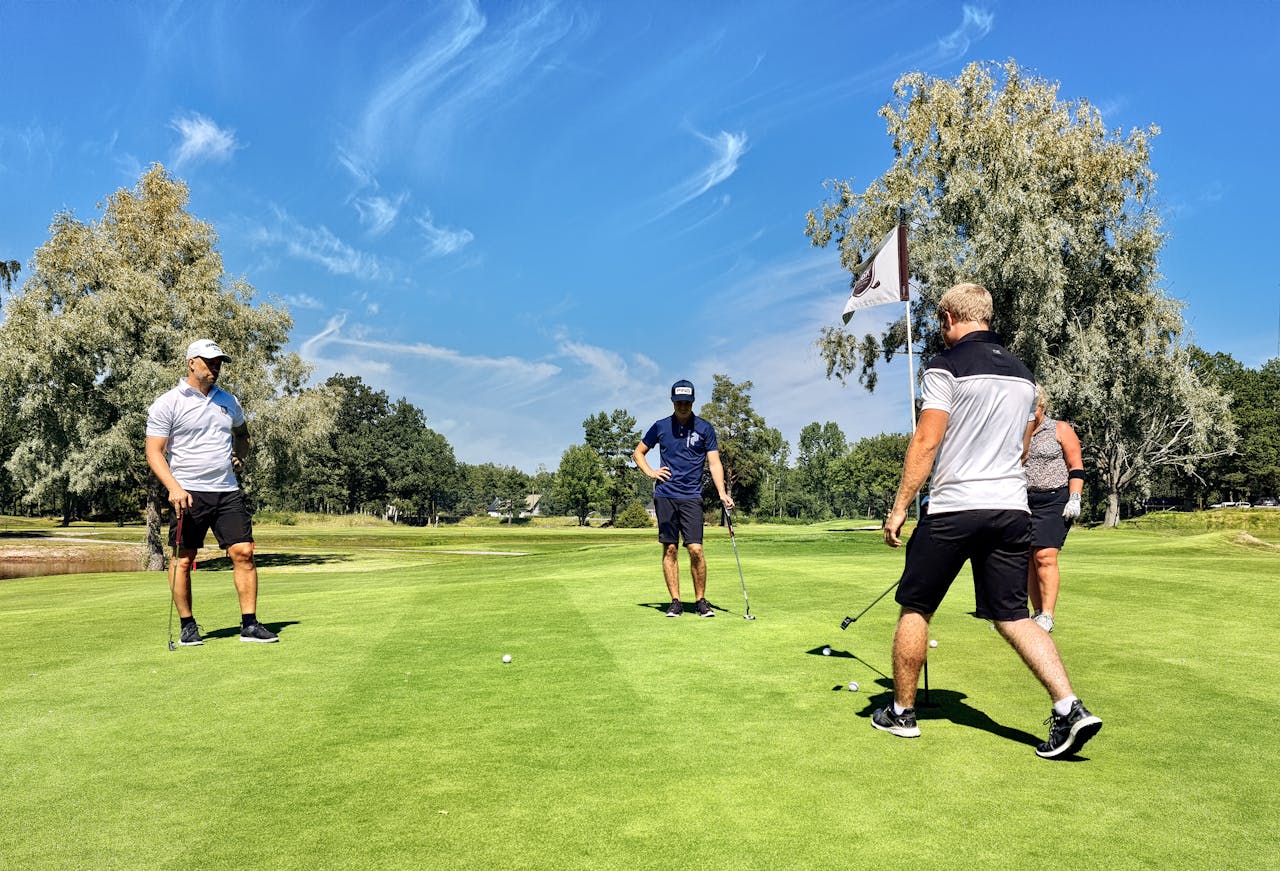
Golf has long been a favourite pastime, and its popularity is particularly notable among senior citizens. This sport offers an excellent opportunity for physical activity without the intense strain associated with higher-impact sports, making it an ideal choice for older adults. The numerous health benefits of golf for seniors extend far beyond just physical fitness; this enjoyable game can significantly enhance mental well-being, social connections, and overall quality of life.
There are myriad health benefits of golf for seniors that make it more than just a leisurely hobby. At its core, golf provides substantial cardiovascular exercise through walking the course and swinging the club. Additionally, it plays a pivotal role in maintaining muscle tone and strength while improving flexibility and balance—all essential factors in reducing the risk of falls. Moreover, the calorie-burning experience through regular play can aid in effective weight management.
But the advantages don’t stop at physical health; golfing also brings numerous mental perks that sharpen the mind and soothe the soul. Strategising shots and focusing on gameplay stimulate cognitive function, which helps keep the brain active as we age.
Furthermore, spending time outdoors amidst nature provides significant stress relief and promotes better sleep patterns. All these factors contribute to making golf not just a sport but a transformative experience for seniors looking to improve various aspects of their lives.
Physical Health Benefits of Playing Golf
One of the foremost physical health benefits of golf for seniors is its positive impact on cardiovascular health. Walking an 18-hole golf course can span up to five miles, providing a substantial amount of aerobic exercise that strengthens the heart and improves blood circulation.
This low-intensity, steady-state cardiovascular activity helps lower blood pressure, reduce bad cholesterol levels, and increase overall heart fitness. Engaging in such regular physical activity is particularly important for seniors as it can significantly reduce the risk of heart disease.
Additionally, golf provides an excellent workout for muscle tone and strength without placing undue stress on the joints. The act of swinging a golf club involves multiple muscle groups, including those in the arms, shoulders, torso, and legs. Carrying or pushing a golf cart with clubs also contributes to enhancing upper body strength.
These repetitive motions and weight-bearing activities are beneficial because they help build muscle mass while being gentle on arthritic joints. For seniors looking for ways to maintain or improve their muscle tone through low-impact exercise, golf offers a balanced regimen.
Flexibility and balance are other notable physical benefits derived from golfing. The various stances and movements required to execute different shots demand a degree of flexibility and coordination which, over time, can enhance overall mobility.
This is crucial because improved flexibility reduces the likelihood of injuries from falls—a common concern among older adults—while better balance contributes to day-to-day stability. Weight management is another advantage since playing golf burns approximately 300-400 calories per hour, encouraging weight reduction or maintenance while having fun.
Benefit Description
- Cardiovascular Health: Walking up to five miles increases heart fitness.
- Muscle Tone & Strength: Swinging clubs strengthens multiple muscle groups.
- Flexibility & Balance: Improves overall mobility and reduces fall risk.
- Weight Management: Burns around 300-400 calories per hour.
Mental Health Perks
The mental health benefits of golf for seniors are numerous, contributing significantly to the overall well-being of those who regularly play this classic sport. One key advantage is the cognitive challenges that come with strategising each shot and navigating the course. Golf requires a sharp mind for calculating distances, selecting the right clubs, and planning shots to avoid hazards. This constant mental engagement aids in enhancing mental acuity, improving focus, and maintaining cognitive function as one ages.
Additionally, the game of golf offers exceptional stress relief. Spending hours on a beautifully manicured golf course surrounded by nature provides a serene escape from daily stresses. The combination of fresh air, physical activity, and peaceful surroundings has therapeutic effects that reduce anxiety and promote relaxation. It’s not merely about hitting the ball; it’s about taking in the scenery, enjoying the moment, and finding peace amidst natural beauty.
Furthermore, regular participation in outdoor activities like golf can considerably improve sleep patterns. Engaging in physical exercise outdoors helps regulate circadian rhythms due to exposure to natural light and promotes better sleep quality at night. This is particularly beneficial for seniors who might struggle with insomnia or irregular sleep cycles. Therefore, incorporating golf into regular routines can lead to more restful nights and subsequently enhance daytime alertness and mood.
- Cognitive Challenges: Enhancing mental acuity through strategy and focus.
- Stress Relief: The therapeutic effects of nature and physical activity.
- Improved Sleep: The impact of regular outdoor exercise on sleep patterns.
These cognitive enhancements underscore why embracing golf can be pivotal for seniors looking to maintain both their mental sharpness and emotional equilibrium.
Social Connections and Emotional Well-Being
Building a Community
One of the remarkable health benefits of golf for seniors is the opportunity to build a strong sense of community. Golf courses and country clubs offer an ideal setting for social interactions that can lead to lifelong friendships. These communities provide a platform for seniors to meet like-minded individuals, share experiences, and enjoy camaraderie. Regular golf meets, tournaments, and social events foster a sense of belonging that is essential for maintaining emotional well-being as we age.
Combatting Loneliness
Loneliness is a common issue among seniors, but golf offers an excellent remedy by providing numerous opportunities for meaningful social interaction. Whether it’s a casual round with friends or participating in local leagues, spending time on the golf course helps combat feelings of isolation. Engaging in friendly competitions and enjoying post-game social activities such as club dinners or barbecues helps keep loneliness at bay while enriching one’s emotional life.
Emotional Benefits
Participating in golf not only enhances physical and mental health but also brings several emotional benefits. The sheer joy of hitting a nice shot or completing a challenging hole can boost self-esteem and reduce anxiety. Furthermore, being surrounded by fellow golfers who share similar passions creates an environment that encourages positivity and happiness. Many seniors find that regular play reduces stress levels significantly, thanks to both the physical activity and the supportive social network they develop through the game.
The Importance of Fresh Air and Sunshine
Vitamin D: Essential Benefits
Getting out on the greens exposes seniors to natural sunlight, which is a fantastic source of Vitamin D. This nutrient is crucial for maintaining healthy bones by aiding in calcium absorption. Seniors often face risks related to bone density loss, leading to conditions like osteoporosis.
Regular exposure to sunlight while playing golf ensures they receive this essential vitamin naturally, which contributes significantly to their overall health and well-being. Additionally, adequate levels of Vitamin D can positively affect mood, helping combat feelings of depression or anxiety that sometimes accompany ageing.
Connecting With Nature
The game of golf typically takes place in beautifully landscaped settings surrounded by lush greenery and often scenic views such as lakes or mountains. These environments provide a therapeutic backdrop that can greatly enhance mental well-being.
Engaging with nature has been shown to reduce stress levels and improve emotional health, providing a sense of peace and tranquillity. For seniors who may spend much time indoors or in urban settings, the opportunity to immerse themselves in natural beauty can be incredibly refreshing and beneficial for both mind and body.
The Calming Effect of Green Spaces
The calming effect associated with spending time in green spaces should not be underestimated. Research has shown that regular exposure to nature can lead to decreased levels of cortisol—a stress hormone—in the body. For seniors, lowering stress can result in a better quality of life as it encourages relaxation and improves sleep patterns.
The act of walking from hole to hole provides not just physical exercise but also allows for mindful contemplation amidst serene surroundings. Thus, the health benefits of golf for seniors extend far beyond physical fitness; they encompass emotional calmness brought on by regular interactions with Mother Nature herself.
Customising Golf for Senior Needs
Adapting the game of golf to meet the specific needs of seniors is crucial in ensuring maximum enjoyment and therapeutic value. By leveraging specialised equipment, senior golfers can experience improved performance and comfort. Adaptive golf clubs, for instance, are designed with lighter materials and more flexible shafts, allowing for easier swings without sacrificing distance or accuracy.
Additionally, larger club heads offer a greater margin for error, making it easier to make solid contact with the ball. Lightweight golf balls that maximise distance even with slower swing speeds are also available, helping seniors take full advantage of their strength and endurance.
Incorporating modified rules and shorter courses can further enhance the accessibility of golf for seniors. Simplifying rules such as reducing penalties or allowing mulligans can help minimise frustration and keep the game enjoyable. Shorter courses, also known as executive courses, provide an excellent alternative by reducing walking distances while still offering a challenging layout. These adjustments ensure that seniors remain active without overexerting themselves, harnessing the health benefits of golf for seniors in a manageable way.
Seniors should also pay attention to essential health considerations while out on the course. Staying hydrated is paramount; carrying a water bottle and taking frequent sips can prevent dehydration, especially during warm weather. Scheduling tee times during cooler parts of the day not only helps avoid peak sun hours but also reduces exposure-related risks such as heatstroke or sunburns.
Wearing breathable clothing along with hats and sunscreen provides additional protection from harsh UV rays. Pacing oneself throughout the game by taking breaks between holes ensures sustained energy levels and minimises fatigue, maximising both enjoyment and health benefits derived from golfing activities.
By customising various aspects of golf to cater specifically to senior players’ needs, we can create an inclusive environment where everyone has equal opportunities to appreciate this timeless sport’s physical, mental, emotional, and social rewards.
Success Stories
One inspiring case is that of Henry, a 68-year-old retiree who took up golf after his doctor recommended increasing physical activity. Initially sceptical, Henry soon found that playing golf three times a week had significant benefits. Not only did he shed 10 pounds in the first six months, which helped alleviate his knee pain, but his cardiovascular health also improved noticeably.





